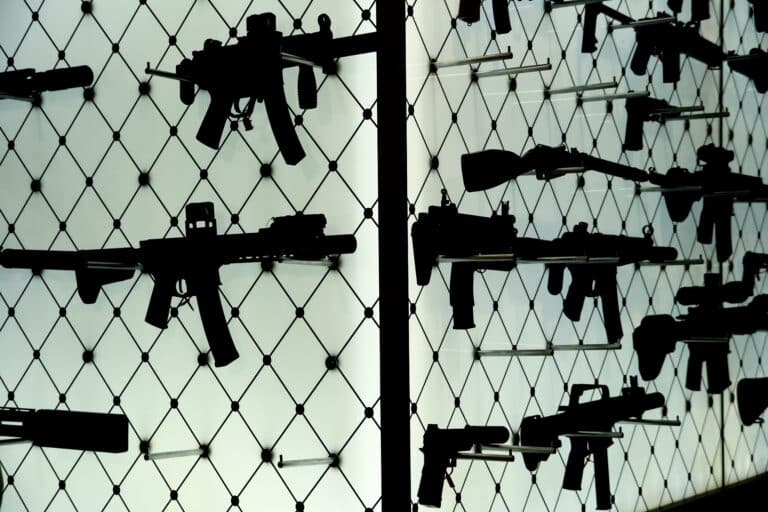Gun-rights advocates hoping the Supreme Court would finally weigh in on the question of so-called assault weapon bans were once again left disappointed this week. However, Justice Clarence Thomas offered them a lifeline.
On Tuesday, the Supreme Court cleared its plate of eight pending gun case petitions by ordering them back down to the lower courts to be reheard in light of its Rahimi decision. A separate collection of gun cases—six lawsuits collectively challenging municipal and state-level AR-15 and magazine bans in Illinois—got a different treatment. The Court flatly denied their appeals.
At first glance, that might seem like a devastating blow to gun-rights advocates fighting against hardware bans. After all, the cases dealing with prohibited person categories and New York’s legally dubious concealed carry restrictions were given the GVR treatment—suggesting the Justices are paying close attention to those issues—while the hardware ban cases were instead given the cold shoulder. Does that mean the Supreme Court is just not interested in dealing with AR-15 and magazine bans?
Not necessarily.
Alongside the Court’s denial, Justice Thomas issued a brief opinion suggesting that it was simply a matter of where the cases currently stand procedurally.
“This Court is rightly wary of taking cases in an interlocutory posture,” he wrote. “But, I hope we will consider the important issues presented by these petitions after the cases reach final judgment.”
In other words, because the challenges to Illinois’ various hardware ban regimes are only at the preliminary injunction stage rather than a full merits decision, the Court would like to respect the procedures of the lower courts it superintends before weighing in. That should not come as much of a shock to those who have been following the legal saga over the Illinois cases. The Supreme Court denied requests for its intervention on an emergency basis twice before in one of the six cases that were rejected on Tuesday.
Going beyond the procedural issues at play, however, Thomas offered gun-rights supporters some hope by opining on the importance of the Court addressing state-level hardware ban cases sooner rather than later.
“We have never squarely addressed what types of weapons are ‘Arms’ protected by the Second Amendment,” he wrote. “To be sure, we explained in District of Columbia v. Heller, that the Second Amendment’s protection ‘extends, prima facie, to all instruments that constitute bearable arms, even those that were not in existence at the time of the founding.'”
“And, we noted that ‘the Second Amendment does not protect those weapons not typically possessed by law-abiding citizens for lawful purposes,’ recognizing ‘the historical tradition of prohibiting the carrying of dangerous and unusual weapons,'” he added. “But, this minimal guidance is far from a comprehensive framework for evaluating restrictions on types of weapons, and it leaves open essential questions such as what makes a weapon ‘bearable,’ ‘dangerous,’ or ‘unusual.'”
He even took direct aim at the opinion of the Seventh Circuit Court of Appeals, which upheld Illinois’ weapon and magazine restrictions. He referred to the opinion as “nonsensical” and “unmoored from both text and history,” heavily implying that he would reverse the lower court and declare those bans unconstitutional in a hypothetical future case.
“The Seventh Circuit’s decision illustrates why this Court must provide more guidance on which weapons the Second Amendment covers,” he wrote. “In my view, Illinois’ ban is ‘highly suspect because it broadly prohibits common semiautomatic firearms used for lawful purposes.’ It is difficult to see how the Seventh Circuit could have concluded that the most widely owned semiautomatic rifles are not ‘Arms’ protected by the Second Amendment.”
He concluded his brief remarks with a stark warning for the Seventh Circuit as it considers the Illinois cases for final judgment and urged his fellow Justices to remain vigilant on the issue.
“These petitions arise from a preliminary injunction, and the Seventh Circuit stressed that its merits analysis was merely ‘a preliminary look at the subject,'” he wrote. “But, if the Seventh Circuit ultimately allows Illinois to ban America’s most common civilian rifle, we can—and should—review that decision once the cases reach a final judgment. The Court must not permit ‘the Seventh Circuit [to] relegat[e] the Second Amendment to a second-class right.'”
It’s hard to read Thomas’ comments as anything but a full-throated declaration that he understands assault weapon bans, at least as codified in the state of Illinois, to be plainly unconstitutional under the Second Amendment.
Of course, it still leaves that matter of actually getting the Court to agree to hear a hardware ban case. Given that the petition for certiorari was denied this time, at least six Justices are currently unwilling to address the issue (four votes are required to grant certiorari). Notably, no other Justices signed on to Thomas’ brief opinion regarding the Court’s denial of certiorari in the Illinois cases. Perhaps that means Thomas’ analysis of the legality of assault weapon bans isn’t shared by his peers on the Court. After all, it wouldn’t be the first time Thomas has gone further in his interpretation of the Second Amendment than the rest of his fellow Justices were comfortable with.
But there is reason to think at least some of the other conservative members of the Court are also interested in addressing the question. Justice Samuel Alito noted that he would have voted to take the Illinois cases for this upcoming term, though he did not choose to write separately on the matter himself. Additionally, Justice Brett Kavanaugh has already articulated his thoughts on why an assault weapon ban violates the Second Amendment during his time on the D.C. Circuit in a proto-Bruen text, history, and tradition analysis.
Finally, Justice Thomas staking out an early and forceful claim against a gun law that the Court declined to review, only to later have his claim addressed and vindicated by his fellow Justices, is not without precedent. He issued a dissent from denial opinion in the 2017 case Peruta v. California on the infirmities of the Golden State’s may-issue permitting regime.
“The Court’s decision to deny certiorari in this case reflects a distressing trend: the treatment of the Second Amendment as a disfavored right,” he wrote. “The Framers made a clear choice: They reserved to all Americans the right to bear arms for self-defense. I do not think we should stand by idly while a State denies its citizens that right, particularly when their very lives may depend on it.”
Five years later, Thomas authored the majority opinion in Bruen. That 6-3 ruling struck down may-issue permitting as unconstitutional nationwide.
In other words, though it is possible that the Court is uninterested in striking down state-level hardware bans, the issue could simply be a matter of it waiting for the right case at the right time. While that may frustrate gun-rights advocates, it at least offers them some hope of an eventual victory down the line.







2 Responses
Thomas has made clear his desire to take an “AWB” case. That much is certain. Considering the court GVR’d the MD 4th cir case already, it is not surprising they refused the IL case for now. I for one, am not concerned that no one else signed with Thomas. Clearly the court is awaiting the final outcome of the 4th and 7th cases to run their course. My concern lies with the wrong outcome of this next election and a liberal rebuild of the court before a case is decided.
Interesting. I also tend to think the Court will take up an AWB case once it gets one it likes. However, it’s not clear that’s the case or that they’ll do it anytime soon. I’d be surprised if more than one of the conservatives voted to uphold an AWB, but I think we only have two on record at the moment. Thomas and Kavanaugh, right?
Court-packing is a real issue. But even if Biden wins, it seems unlikely Democrats hold the Senate based on which seats are up this cycle. So, the threat of it happening after this election is at least somewhat diminished.